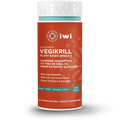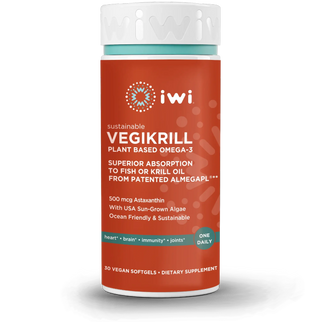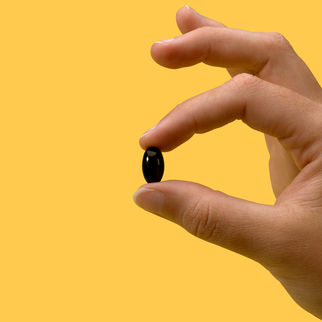If you have ever looked into omega-3 supplements before, you have probably heard about krill oil or fish oil and algae oil. These two sources of this valuable fatty acid are commonly found in nutritional and dietary supplements.
But what is the difference between these two oils? Is one better than the other, and do they really support the health of your heart? Which one should you choose?
Those are the questions we hope to answer here at iwi life. Keep reading for a full breakdown of these two sources of omega-3 and find out which one comes out on top.
What Is Krill Oil?

Krill oil is a common source of omega-3 when it comes to supplements. Although they may not show up on most menus in the U.S., they are eaten in some parts of the world. By far, though, the majority of krill that are caught commercially are processed for uses other than fine dining, especially for nutritional value. Krill oil is high in omega-3, vitamin A, and antioxidants.
Krill are small shrimp-like creatures that live in the ocean. Ranging in size from one to six centimeters, there are nearly 100 species of krill worldwide; one species in particular, though, is considered a "keystone species" of the ocean, and it happens to be the one targeted for supplement manufacturing.
The word "krill" actually comes from a Norwegian word for "whale food," which gives you a good sense of the importance of this tiny crustacean. Not only whales, but seals, penguins, and larger fish rely on krill for food.
Krill eat algae at the ocean's surface which have captured carbon dioxide from the air. The krill excrete the carbon as sediment at the bottom of the ocean, helping remove CO2 from our atmosphere. When krill are removed from the seas at a massive rate, not only is the food chain disrupted, but this process of carbon sequestration as well. The concept of a "keystone species" is very real — without them, the whole structure falls apart.
How Effective Is Krill Oil?
Krill oil is naturally found in the phospholipid form, a form of fat that is better utilized by the human body than the triglyceride form that fish oil naturally occurs in.
Although it is a step better absorbed than fish oil, we need to ask ourselves if the disruption to the ocean is worth it if there are even better-absorbed options available. In fact, some major natural foods stores refuse to sell krill oil supplements because of the negative environmental impact.
What Is Algae Oil?
Algae oil is a fairly incredible source of omega-3. In fact, algae is the original source of omega-3 on the planet: fish and krill are rich in omega-3 solely because they eat algae. In fact, even the powerful antioxidant astaxanthin that makes krill oil famous comes from krill eating algae. If your experience with algae is limited to home swimming pool maintenance, then it may surprise you to learn that there are at least 33,000 named species of algae in the world, some with powerful nutritional benefits for humans. If you find your diet lacking in algae, it may be time to look into algae supplements.
How Is It Made?
Algae grows in many conditions, and one unique species can grow in a climate that makes it a perfect solution for dietary supplement production.
Nannochloropsis algae is special. It can make its own energy from the sun (like all plants) through photosynthesis. Because of this, it takes in carbon dioxide and releases oxygen. It isn't very finicky when it comes to temperature or saltiness of the water it lives in, either.
iwi life has found that we can grow this tiny power plant in large, open-air beds (like your raised vegetable garden at home!), let it soak up the sunshine of the barren desert, and give it salty water from underground aquifers found just below the surface of the desert. Since this type of algae originally lived in the ocean, salt water is perfect!
Not to mention, it leaves those valuable krill in the ocean where they can continue to help absorb atmospheric carbon. It’s an incredibly sustainable practice.
How Effective Is Algae Oil?
On top of being quite sustainable, algae oil is incredibly well-absorbed. The omega-3 in iwi life’s algae is naturally bound to glycolipids and phospholipids, so they have both fat- and water-soluble properties, enhancing the delivery of omega-3 in your body for maximum absorption.
Because of this, iwi life’s algae oil is absorbed by your body about twice as efficiently as fish or krill oils. It also has a high level of EPA and DHA, which are the omega-3s that you should be after in your supplements since they are the true, pre-formed versions of omega-3 that your body needs..
Omega-3 supplements made from this source, like iwi life VegiKrill, are incredibly effective, and they give you the nutrition you need to support the health of your heart, brain, eyes, joints, and more.
What Is Omega-3?
Krill oil and algae oil supplements both offer you a good source of omega-3 fatty acids.
That said, what is omega-3, exactly?
It’s an important type of fat that regulates many crucial processes in our bodies.
Omega-3 is a long-chain polyunsaturated fat — you might hold the misconception that fats are bad for you and that you should avoid them, but this is not the case with omega-3.
If fat is polyunsaturated, it has more than one carbon bond in the molecule. On top of making the fats healthier, this also makes these fats liquid at room temperatures, such as olive oil, avocado oil, and canola oil.
It’s important to look to sources like omega-3 for your fat intake rather than unhealthy fats. Trans fats, in particular, which are commonly found in processed foods, are quite bad for you. They are solid at room temperature and can clog up your arteries, increasing your risk for adverse health events.
In addition to being a great source of energy for your body, polyunsaturated fats, particularly omega-3, have many potential benefits for your body. Here are some of the things it can do for you.
Heart Health
One of the first things that omega-3 does is support the health of your heart. Two particular omega-3s, eicosapentaenoic acid (EPA) and docosahexaenoic acid (DHA), Two particular omega-3s, EPA and DHA, may help maintain cholesterol levels that are already within the healthy range — and this, in turn, can help support the health of your cardiovascular system.
This is especially important considering that high cholesterol is a big problem in the United States. An estimated 94 million American adults have high cholesterol, which is about one-third of the adult population in the US.
So omega-3 is an incredibly important tool in your arsenal that can support the health of your heart by giving it the nutrients it needs to function properly.
Brain Health
Omega-3 also supports the health of your brain. In the brain, DHA plays an incredibly important role in supporting a healthy inflammatory response. Both DHA and EPA work to support and maintain a proper level of inflammation for overall health and wellness, keeping your body in balance.
Inflammation in the brain can cause damage to the brain cells and increase your risk of risk of certain negative health outcomes. Omega-3 can help support your brain health in the long term.
Eye Health
Omega-3s play a similar role in the eyes — DHA can support the health of your eyes, especially as you age.
Omega-3 is a powerful lipid that can be used by your cells to support the cell membranes. Most cell membranes in your body are made from lipids, so omega-3 can be utilized to support your eye cell structures and protect your eye cells.
Joint Health
Finally, omega-3 can help support joint health. Having healthy levels of omega-3 in the bloodstream has been shown to support good blood flow throughout the body. When our blood is moving, our natural inflammatory response is balanced, helping reduce stiffness and tightness in joints so that we can keep moving — which, in turn, helps support healthy joints.
In addition, omega-3s are critical to helping cells in the body hold onto water content, and when our joints are well-hydrated, they feel more comfortable and are more resilient.
Pregnancy
Omega-3 is incredibly important for growing fetuses and babies. This is why omega-3 is highly recommended in prenatal supplements, and DHA is an important ingredient in baby formula. These fats can support your health and your baby’s health during pregnancy and infancy.
An Important Supplement and Nutrient
When comparing krill oil and algae oil, it seems that algae oil comes out on top. Not only are the farming practices more sustainable and better for the environment, but the omega-3 found in algae oil absorbs into the body better.
At iwi life, we don't think you should have to choose between your health and the health of the planet. That's why we've created VegiKrill: a totally vegan supplement that provides true EPA and DHA omega-3 with superior absorption (even higher than krill), plus antioxidant astaxanthin...all from algae.
If you have a choice to make, choose algae oil supplements for your omega-3 intake and support your health on a day-to-day basis.
Sources:
Omega-3 Polyunsaturated Fatty Acids: Benefits and Endpoints in Sport | PMC
Omega-3 Fatty Acids and Inflammatory Processes - PMCOmega-3 Fatty Acids and Inflammatory Processes - PMC
Omega-3 Fatty Acids Fact Sheet for Consumers | National Institutes of Health (NIH)




















